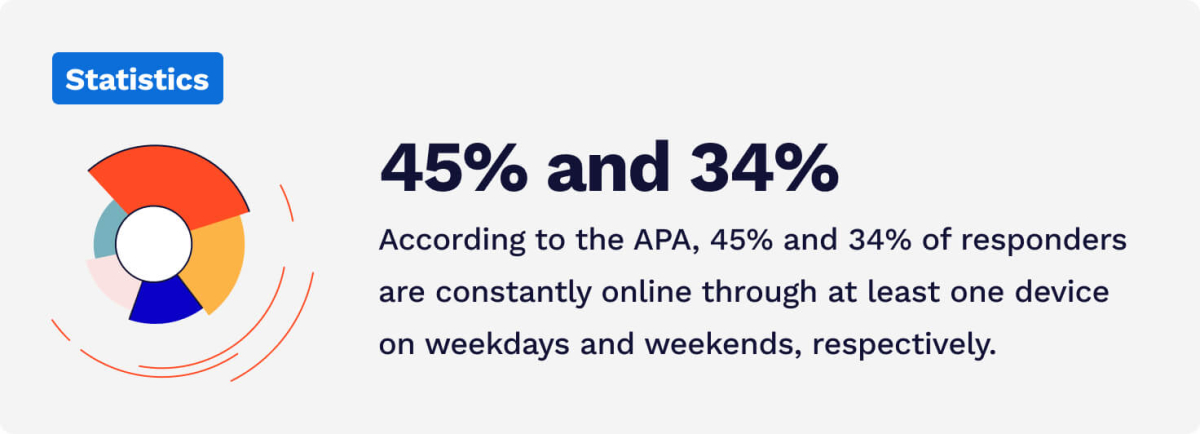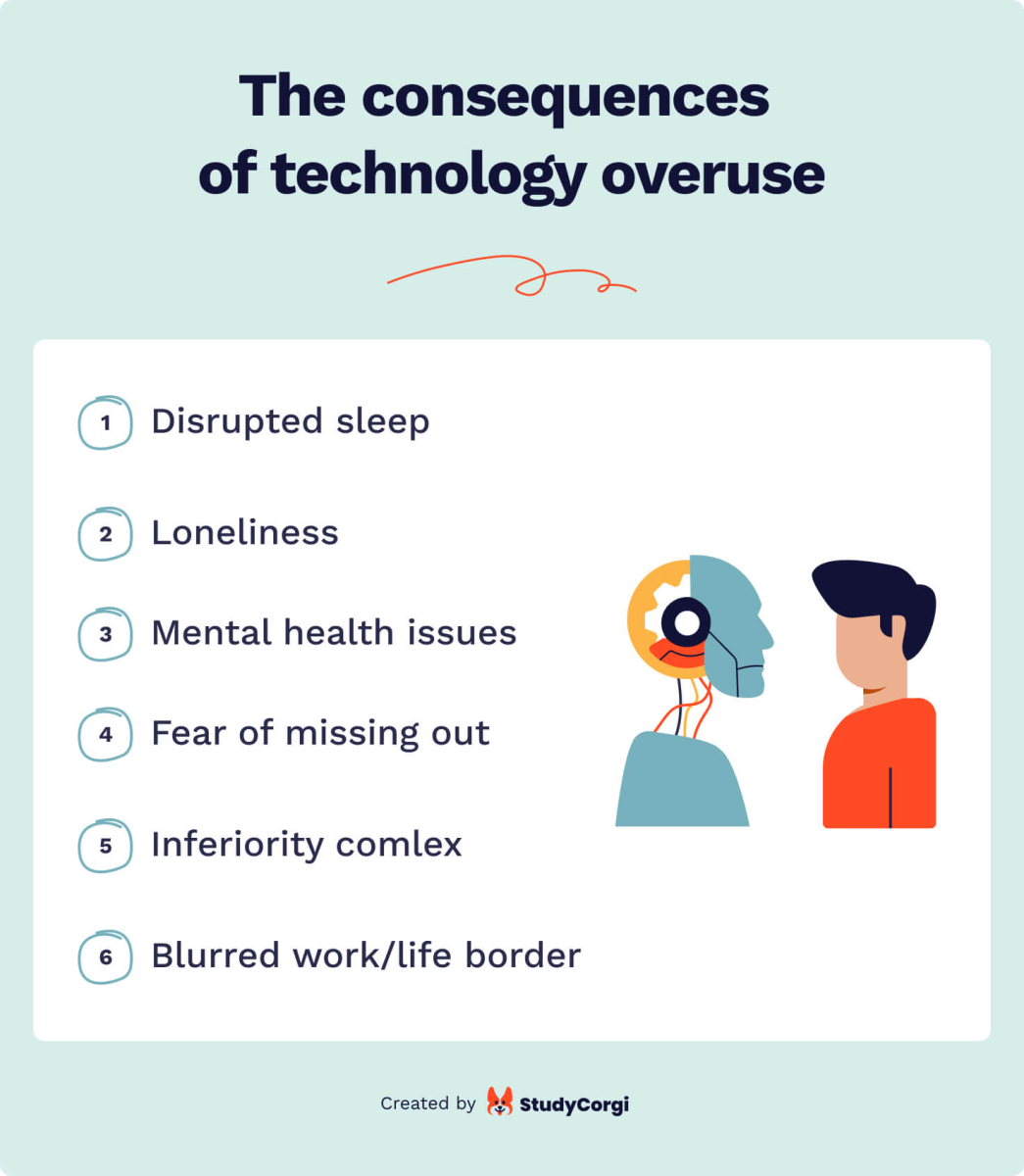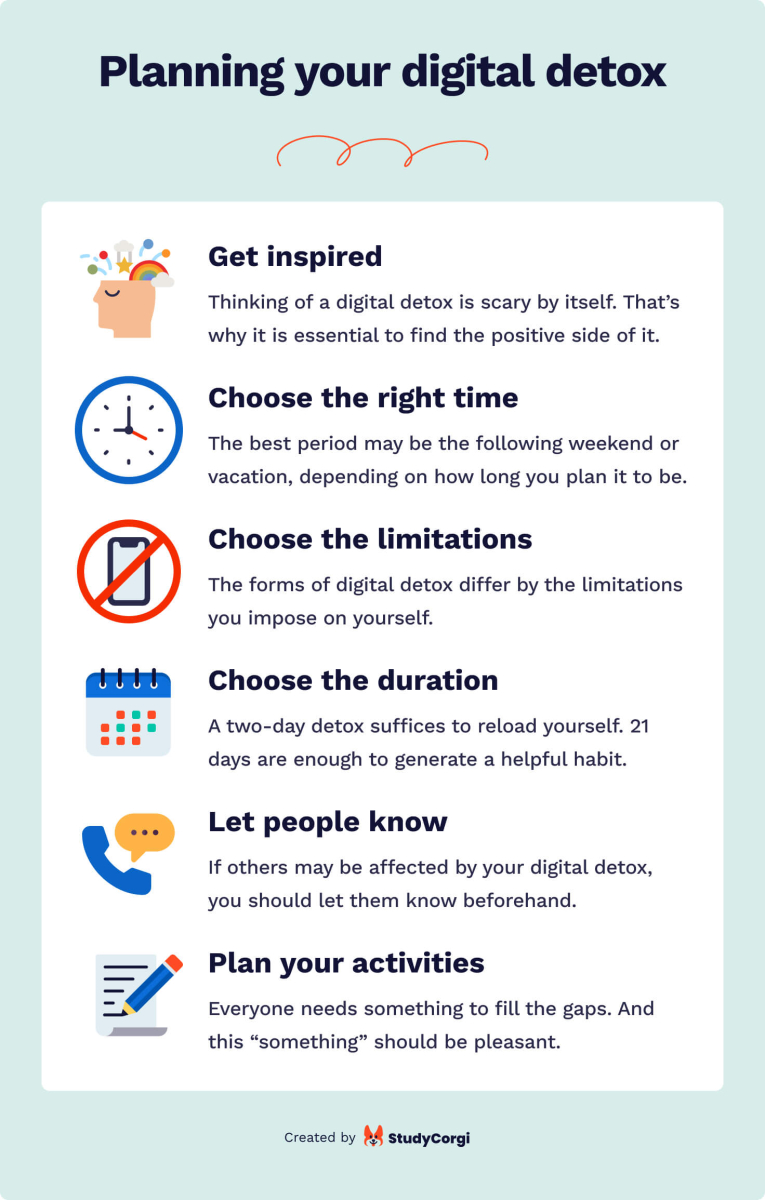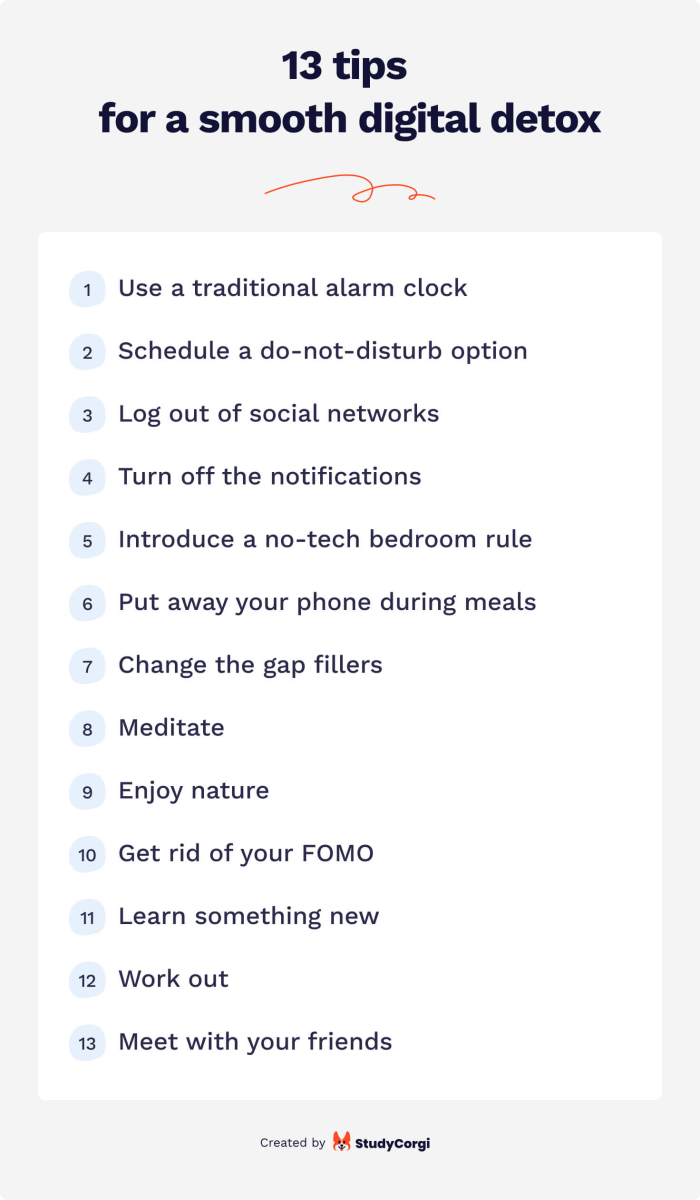Permacrisis is a portmanteau word that describes our new reality: inflation, political instability, war, and public unrest. It has been named the 2022 word of the year.
We exist in a constant flow of intense, emotionally-charged news. Most of us fall into one of two extremes: either we ignore the news entirely, or we read every detail. The latter is called doomscrolling – another neologism that denotes the tendency to obsessively scroll through bad news on our phones.

A digital detox is an indispensable mental health tool these days.
This article by our experts explains what a digital detox is, how to do one, and when you might want to stay in the loop. Finally, you will learn how to do an effective digital detox.
🌱 What Is a Digital Detox?
The word detox (abbreviated from detoxification) describes the process of eliminating toxins from your body. Many people use a specific set of products (vitamins, minerals, laxatives, diuretics, and other foods) to remove these toxins. Although some question the safety of following a detox diet, most will admit that it helps you develop healthy habits. Most generally, during a detox diet, you are advised to eliminate toxin-containing products by replacing them with more beneficial options.
A digital detox diet may substantially elevate your quality of life. It urges you to recognize your overuse of digital media, which is half the battle.
According to the American Psychological Association, 45% and 34% of responders are constantly online on at least one device on weekdays and weekends, respectively. Moreover, the stress levels of constant social media checkers are higher than those who engage with technology less frequently.
Technologies may be as harmful to your mind as toxic substances are to your body. There are four digital detox formats:
- Social media detox. Restrict your access to social media for a given period.
- Express detox. Give up all your devices for a weekend or holiday.
- Digital abstinence. Choose one day per week for a digital detox.
- Targeted detox. Restrict your access to a specific app, website, or game.
But it would be useless to recommend that you turn off your phone completely, just like it would be pointless to tell someone to stop drinking soda altogether.
Instead, advise them to replace each soft drink with a glass of fresh juice. It is much easier to modify a habit than to fight it. Use the free time you obtain through one of these detox formats to practice a sport, meet up with your friends, or study a foreign language.
🤖 Is Technology so Bad?
Most of us believe it is impossible to function in the modern world without technology. But as we’ve mentioned before, technology use massively contributes to stress. Note that it’s not the type of stress we undergo during a quarrel or an accident.

Like Chinese water torture, technology overuse undermines your well-being by being mild but consistent.
And here’s how:
✅ Digital Detox Checklist: Do You Really Need It?
You need a screen detox if:
- You spend much more time using your phone than you had planned.
- Your partner complains that you spend too much online.
- You feel anxious when you cannot check your messages, even when you don’t expect anyone to write you.
- Your phone is the last thing you see before bed and the first after waking up.
- You answer work-related emails during family time.
- You scroll through your feed even when you meet your friends.
- You often miss a part of a movie because you’ve been staring at your phone.
- You miss deadlines because of online distractions.
- Screen time brings only dissatisfaction and guilt.
- You feel incredibly busy even though little to no work gets done.
📵 How to Do a Digital Detox: The Ultimate Guide
Now let us move on to the most exciting part – how to do a digital detox. Let’s be honest. Completely rejecting digital devices sounds horrifying. And for most people who work and study, it is hardly realistic.
Still, there is no need to give up your phone altogether.
Following this brief list of digital detox tips and tricks will suffice to bring you noticeable results within a week.
Good luck, and enjoy the time you would have usually used for pointless scrolling!
Planning Your Digital Detox
A cell phone detox is likely to end early if you don’t have a plan. We recommend that you are thorough in the planning stage.

Get Inspired
Thinking about a digital detox is scary enough by itself. Many of us fear that we’ll miss out on things once we log out. That’s why it is essential to focus on the positive part of the experience.
- List the things you’ll find time to get done once you limit your use of devices.
- Think of at least three activities that you like and that you never have time to do.
- Remind yourself of the benefits for your mental and physical health (decreased stress, better sleep, improved relations with friends and family, etc.).
- Imagine how your life will change once you’ve turned off your devices.
Choose the Right Time
You may feel the urge to start right now, but that’s not a good idea. It is better to postpone a digital detox for a time when you are in a peak work mode or even exam week.
Ask yourself, will there be dire consequences if you miss a message? If not, then that’s the right time to start the tech detox!
The best time may be the following weekend or while you’re on vacation, depending on how long you plan the detox to be.
Choose the Limitations
Remember the digital detox formats we mentioned above? They differ by the limitations you impose on yourself.
Most of us need a social media detox, but a targeted detox can help if you are an online gamer.
Check your phone’s integrated screen time tracker if you doubt which app or website takes up most of your time. You might be surprised.
Choose the Duration
- A two-day weekend detox is enough to recharge yourself and cope with the tasks you’ve been putting off. But a more extended period might be better if you have mental health issues or are experiencing professional burnout.
- A four-week challenge is the longest period for a cell phone detox. It will make a huge difference and help you develop a new version of yourself!
- Twenty-one days are enough to generate a helpful habit. Thus, if you aim to get rid of doomscrolling or online stalking, that’s the proper time frame.
Let People Know
If others may be affected by your digital detox, you should let them know beforehand. This way, they won’t be offended by your silence in response to their messages. Moreover, your friends will think twice before sending you a funny meme. Count how many of them you’ve received over the last week and multiply that by the time you usually spend reacting to each.
Keep in mind that there could always be an emergency. Tell your close ones to call you instead of texting.
You can also set up an automatic “out of office” email responder, in which you indicate when you will be available to reply.
Plan Your Activities
We’ve already mentioned that you cannot just delete a part of your routine, especially if it takes 3+ hours a day. Everyone needs something to fill the gaps between their activities. And this “something” should be pleasant and enjoyable.
- Sign up for offline foreign language courses. Getting to know new people is a great way to pass the time.
- Get a gym membership and start doing healthy workouts.
- Plan quality time with a friend or partner and enjoy their reaction. They will appreciate your initiative.
- Combine your spring cleaning with a one-day tech detox.
13 Tips for a Smooth Digital Detox
Every person’s approach to this challenge will be different. Still, we have selected some universal tips to make the process more pleasant. After all, you’re trying to reduce anxiety, not create new stress factors.

Use an Alarm Clock
Recall the last time you set an alarm clock on your smartphone. What happened next? Correct – most likely, you fell into an hour-long news feed scroll. And in the morning, you wished you had spent that time sleeping. We suggest using that old-fashioned timer thing with two bells on top, just in case.
Schedule a Do-Not-Disturb Option
This one goes in tandem with the previous point, as neither will work without the other. Your plan is not to unlock your phone when you feel tempted to break your digital detox.
Every modern smartphone has this feature. So why not let those “good night” pictures from your grandma and election poll news wait till morning?
Log Out of Social Networks
Yes, you’ve read that right. And no, it’s not too much to ask. Your digital detox challenge will be twice as easy if you don’t have to ignore that constant beeping and buzzing. And once again, inform the people you mainly contact online about your decision and offer them alternative ways of reaching you.
Turn Off the Notifications
If the point above seems impossible, you can do this trick. Go to the general phone settings with the list of all your apps. Select those that interrupt you the most often (usually social networks and games) and select “turn off notifications.” And for a short-term detox, “sleep mode” your iPhone.
Introduce a No-Tech Bedroom Rule
If none of the four paragraphs above help, use this last resort. Whenever you enter your bedroom, leave your phone outside the door. It may seem inconvenient at first, but developing the habit won’t take long. You will get hours of additional sleep, and your health will improve dramatically.
Put Away Your Phone During Meals
Meal times have the power to unite us. That’s why we use the phrase “to share a meal.” But when everyone is busy with their screen, there’s nothing to share about.
Also, count how many hours a day you spend eating. On average, your answer could be about 1,5 hours. You can detox for another hour and a half by leaving your phone in your pocket during meals. That’s a considerable basis for a long-lasting habit.
Besides, minding what you eat also helps to lose some pounds. Combo!
Change the Gap Fillers
Most of us have a habitual way of using schedule gaps. It can be calling your mom, reading the latest news, scrolling your Facebook feed, or smoking. If your days are incredibly busy, your gap fillers are usually unhealthy.
Dedicate the time spent waiting between activities to something productive. Read a book, practice a hobby, or learn foreign words. In this way, aimless time will become “me time.” And self-development can make the most challenging day more pleasant.
Meditate
Meditation is the best gap filler, requiring neither resources nor a particular setting. Track your breath and your body’s feeling, and notice when your mind starts wandering. This practice brings the utmost relaxation and improves mental health. Besides, gurus believe that meditation makes people more resistant to stress.
Enjoy Nature
We only became urban creatures about 200 years ago. For the 49,800 years before that, humanity lived in rural settings, with rare exceptions of royal families and their entourage. We need nature to feel happy and fulfilled. That’s why vacations are usually associated with the seaside, hiking, and mountain resorts. Don’t rob yourself of the joy of watching the seasons change.
Walking, biking, camping, or playing outdoor games are much better than watching TV shows.
Get Rid of Your FOMO
Less than 1% of notifications are urgent. And as living creatures, we treat anything unknown as critical. Music videos, fun news, and random facts feed our brains with new information, tricking ourselves into thinking it is relevant. But most information you read online has little to no application to your everyday life. Geopolitical trends are exciting to track, but do they really impact your life that much?
The reality is that you will never miss the news that matters. On 9/11, all channels showed what had happened. When a new president is elected, you can go outdoors and ask a casual passerby about the result and receive a well-informed answer.
Learn Something New
Boredom is the “abstinence syndrome” of a digital detox. When you have done everything you had planned, the clock starts ticking slowly. Time becomes endless, and life seems dull and empty. That’s when most people stop their detox and return to the life they lived before. But you’re stronger than that, aren’t you?
Once again, your brain strives for new information. So, give it what it wants! Take a dance class, learn how to write with the other hand, or read a non-fiction book. These activities make our lives more meaningful.
Work Out
Have you read a self-help article that does not remind you to work out? No? Well, this one is no exception. Sports will keep you away from the screen and raise your endorphin levels.
Meet with Your Friends
This is the most evident tip, which most of us forget. We won’t lie to you and say that a digital detox is easy. It is not. That’s why you need moral support. Go see your friends and tell them about your challenge. We are sure they’ll be proud of you, and praise is always encouraging.
But time spent with friends is just as helpful even if you don’t feel like sharing. Discuss something that excites all of you. After all, social media was introduced as a digital meeting spot. Why not go back to the basics?
Returning to the Digital World
Do you know that after stopping a diet, many people start eating even more than they did beforehand? Likewise, a digital detox can result in a total relapse. Here’s how you can quit digital dieting wisely.
- Maintain digital limits to avoid drowning in the endless emails and publications you’ve missed during the detox. Fifteen minutes during your coffee break in the morning and afternoon is enough to keep yourself informed.
- A gradual recovery will help you feel less overwhelmed with news and entertainment. Log into one app every other day (or week). This way, your healthy habit will last, and you’ll see which apps are a waste of time.
- Practice preventative tech detoxes from time to time. Your brain needs maintenance. Mindfulness, meditation, inspirational hobbies, and music nurture your inner world. A weekend detox once in a while will preserve the results you’ve achieved so far.
- Find an activity that is more engaging than scrolling. This is the most challenging recommendation but with the most lasting result. Some people spend an entire lifetime without finding one. You won’t spend hours looking at your screen if there’s something fascinating to do.
Life consists of little moments. The quality of our years depends on how we pass those seconds. We hope this guide will help you cleanse your schedule and make it healthier. Please share your experience below. Others may find it inspiring or instructive, both of which are priceless.
